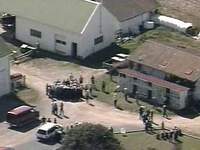Amish community marks one-year anniversary of school shooting
One year ago, the quiet Amish farm community was barely a blip on the map. But its quiet life changed drastically on Oct. 2, 2006, when a gunman entered a one-room Amish schoolhouse and killed five girls and wounded five others.

Though grateful for all the help and sympathy it has received, the Amish community is hoping to be left alone as much as possible Tuesday during the one-year anniversary of the shootings. The Amish practice a simple, rural lifestyle free of most modern conveniences.
The New Hope Amish School, the one-room schoolhouse that replaced the one torn down after the attack, will be closed and there are no plans for a public memorial or commemoration, in keeping with the Amish way of life.
It was about 10:30 a.m. a year ago when Charlie Roberts, a milk truck driver from a neighboring village, showed up at the door of the Amish school an hour's drive west of downtown Philadelphia.
Roberts carried firearms, tubes of sexual lubricant and the hardware he thought he might need to lock himself inside West Nickel Mines Amish School and immobilize his victims.
In a horrifying attack that unfolded over the ensuing 40 minutes, the 32-year-old son of a police officer would shoot 10 girls, killing five, and then kill himself with a shot to the forehead from his 9 mm handgun.
In a brief cell phone conversation with his wife and in suicide notes he left behind, Roberts indicated he was angry with God for the death of his infant daughter in 1997 and riven by the guilt of having molested two girls 20 years earlier.
Roberts seems to have prepared for a lengthy siege, but if that was the case, his plan was foiled when teacher Emma Mae Zook dashed out the door to summon help. About 20 minutes after the incident began, the first state troopers were on the scene.
Their sudden appearance prompted a panicked Roberts to insist they back off. There was virtually no time for negotiation before he abruptly shot the girls in rapid succession.
Roberts left behind a puzzling trail of evidence that authorities today find as senseless as the day the attack occurred. He had no criminal history, had never been treated for mental illness and there seems to be nothing to substantiate his claim of having molested his two relatives decades earlier.
In Nickel Mines, where life had been marked by the predictable rhythms of the growing season and the church calendar, Roberts' attack made the modern world suddenly inescapable.
The usual quiet was shattered by the arrival of hundreds of police and emergency workers and the ominous sound of medical and news helicopters overhead.
Amid the chaos and heartbreak, the Amish instinctively reached out to Roberts' widow Marie, the three children he left behind and his parents. Even before their own five daughters had been buried, the victims' families were showing Roberts' family kindness, condolence and compassion.
About half the 75 mourners at Roberts' graveside were Amish, including family members of victims, and the Amish later designated a portion of the millions in donations they have received to benefit Roberts' children and widow.
On Oct. 12, the Amish had the schoolhouse torn down before dawn, converting the land where it stood into pasture. It only took a few months to erect a new and more secure school nearby.
Four of the five wounded girls returned to class before the end of December, although the fifth and most seriously injured suffered a head wound that left her completely disabled. She is confined to a wheelchair and is fed by a tube.
One girl was recently operated on to help restore function in her shoulder and arm, and another has been plagued by vision problems.
Each day has brought pain and grief for the Amish, a community spokesman said recently, but also a tremendous sense of gratitude and the need to share their experiences with others.
Four months after the massacre at Virginia Tech, in which a student shot 32 people and himself, members of the Amish community traveled to Blacksburg, Virginia, to pass along a comfort quilt.
"All that has been done to lift our burden is greatly appreciated and leaves us with a sense of indebtedness to everyone, but also makes us more aware of our gracious God to whom we owe a larger debt," the Amish community said in a statement last week.
Subscribe to Pravda.Ru Telegram channel, Facebook, RSS!


